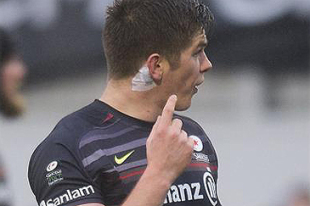|
Australia
Concussion study finds accumulative hits most destructive
ESPN Staff
May 19, 2015

Player wears the Xpack biosensor
© Courtsey: X2 Biosystems
Enlarge
As the concussion debate continues to rage, Sydney rugby club, Randwick Rugby, has been taking part in a concussion study, providing coaches and medical staff with a closer look into the impact players receive during games. Working in conjunction with the Australian Rugby Union Concussion Advisory Group, players take the field while wearing biosensors, about the size of a 10 cent coin, behind the ear, providing coaches and medical staff with crucial data. Nine rounds into the competition, Randwick Rugby Club's director of rugby Nick Ryan said the data had already given the coaches a new perspective on the damage - not just large hits - but accumulative small and medium hits have on players. "What we're finding is the really hard parts, the accumulative hits, the small [and] medium range hits that happen multiple times during a game, are the things that are the most destructive," Mr Ryan told the ABC. "When normally those things don't stand out during a game. And what we're finding with the data is that those are the things that are standing out the most in terms of player welfare." Sydney-based doctor Adrian Cohen, who is running the study, told the ABC he understands the players desire to return to play despite the damage concussion can have and said the sensors provide much needed data that makes it more difficult for players to fudge their symptoms. "We know that players want to get back on the field," Dr Cohen told the ABC. "So if you ask them if they have any symptoms, they say 'nah no symptoms'. And they will move through the return to play process with the aim of getting back on the field. "But what we are learning from the X2 bio sensor is objective data about what went on on the field. We have the G-forces and the rotational forces, which we can see once the data is downloaded. [It means we are] able to then go back to the player and say 'you've had some high scores, let's check you out'." While the governing bodies of rugby union have put their weight behind the research study, it is believed groups remain concerned over how the data could be used in the long term, including players using it in future litigation. "It really is incumbent on the governing bodies to be able to say to the public, 'we know this is a contact sport and there can be problems as a result'," Dr Cohen said. "We are doing everything we can do find out what's going on so we know what is safe and what's not safe."
© ESPN Sports Media Ltd
|
Live Sports
Communication error please reload the page.
-
Football
-
Cricket
-
Rugby
-
- Days
- Hrs
- Mins
- Secs
F1 - Abu Dhabi GP
Abu Dhabi Grand Prix December 11-131. Max Verstappen ()
2. Valtteri Bottas (Mercedes)
3. Lewis Hamilton (Mercedes)
4. Alexander Albon ()
5. Lando Norris ()
6. Carlos Sainz Jr ()
-
ESPNOtherLive >>
Boxing - Nelson v Wilson; Simmons v Dickinson; Joshua v Gavern (Metro Radio Arena, Newcastle)
Golf - Houston Open
Snooker - China Open
Tennis - Miami Open

